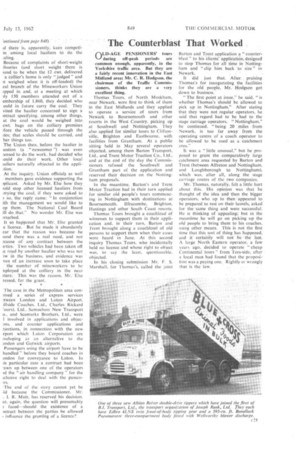The Counterblast That Worked
Page 51

If you've noticed an error in this article please click here to report it so we can fix it.
("LO-AGE .PENSIONERS' tours kJ during off-peak periods are • common .enough, apparently, in the Yorkshire traffic area. But they are a fairly recent innovation in the East Midland area; Mr. C. R. Hodgson, the chairman of .the Traffic Commissioners, thinks they are a very excellent thing.
Thomas Tours, of North Muskham, near Newark, were first to think of them in the East Midlands and they applied to operate a service of tours from Newark to. Bournemouth and other resorts in the West Country, picking up at Southwell and Nottingham. They also .applied for similar tours to Cliftonville, Brighton and Eastbourne, with facilities from Grantham. At a public sitting held in May several operators objected, among them Barton Transport, Ltd., and Trent Motor Traction Co.. Ltd., and at the end of the day the Commissioners refused the Southwell and Grantham part of the application and reserved their decision on the Nottingham proposals.
In the meantime, Barton's and Trent Motor Traction had in their turn applied for similar old people's tours commencing in Nottingham with destinations at Bournemouth, Ilfracombe, Brighton. Hastings and other South Coast resorts.
Thomas Tours brought a coaehload of witnesses to support them in their application and, in their turn, Barton and Trent brought along a coachload of old persons to support them when their eases were heard in June. At this second inquiry Thomas Tours, who incidentally held no licence and whose right to object was, to say the least, questionable, objected. :.
.In his closing submission Mr. F. S. Marshall, for Thomas's, called the joint Barton and Trent application a "counterblast" to his 'clients' application, designed to stop Thomas for all time in Notting ham and "clip him back to " in Newark. . .
It did just that. After, , praising Thomas's for inaugurating the facilities for the old people, Mr. Hodgson got. down to business.
The first point at issue," he said, "is whether Thomas's should be allowed to pick up in Nottingham." After stating that they were not regular operators, he said that regard had to be had to the stage carriage operators. "Nottingham," he continued, "being 20 miles from Newark, is too far away from the operating centre of a coach operator to be allowed' to be used as a catchment area."
It was a "little unusual," but he proposed to grant the comparatively large catchment area requested by Barton and Trent (between Alfreton and Nottingham, and Loughborough to Nottingham), which was, after all, along the stage carriage routes of the two companies.
Mr. Thomas, naturally, felt a little hurt about this. His opinion was that he thought of the idea and then the bigger operators. who 'up to then -appeared to be prepared to rest on their-laurels, asked for the sante thing and were successful. He is thinking of appealing; but in 'the meantime . he will go on picking up the old people to bring them to his coaches, using other means. This is .not the first time that this sort of thing has happened, and it certainly will not be the last. A large North Eastern operator, a few years ago, decided to operate "cheap Continental tours " from Tees-side, after a local man had found that the proposition was a paying one. Rightly or wrongly that is the law.












































































































